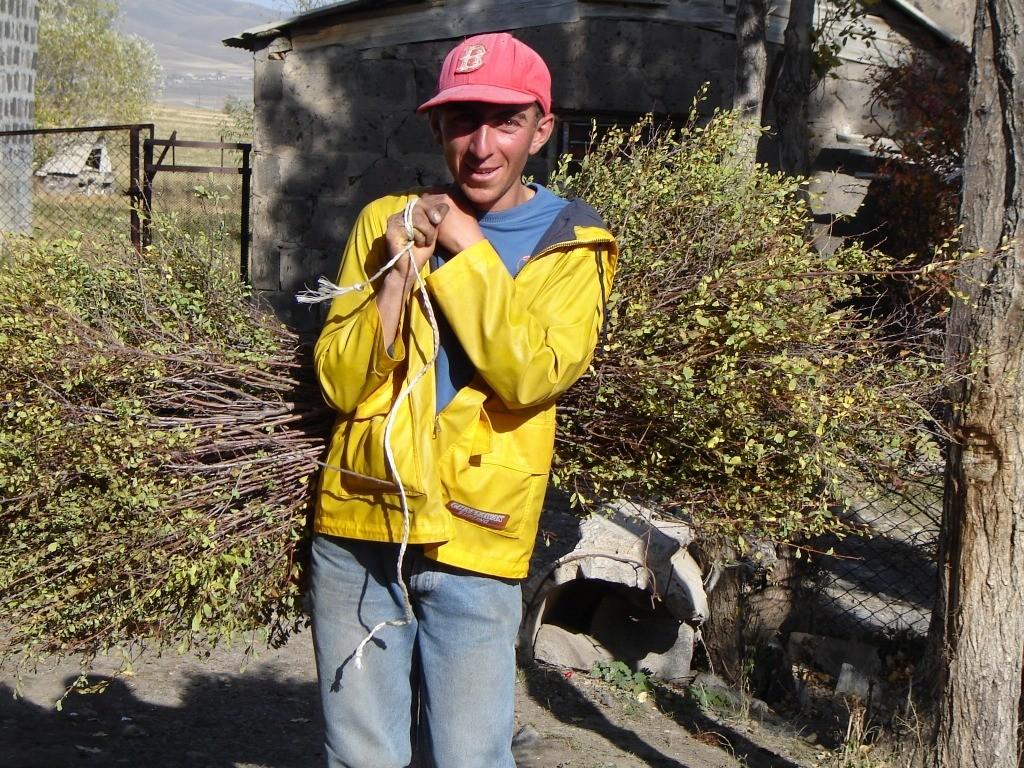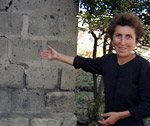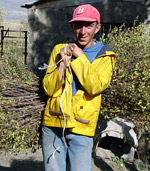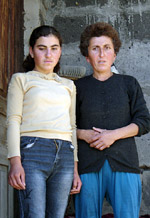
The Petrosyan’s of Aregnadem – “To get a disability pension, someone’s palm has to be greased”
 We’ve never stopped looking at poverty, since we’ve never known what it was to be rich. How we started out, that’s how we’ve continued - one cow, two sheep. We keep those in somebody else’s shed. We don’t have one. We have six hectares of land nearby. Have you ever seen a villager with just three head of animals? It’s unheard of,” says Lousik Hakobyan from the village of Aregnadem.
We’ve never stopped looking at poverty, since we’ve never known what it was to be rich. How we started out, that’s how we’ve continued - one cow, two sheep. We keep those in somebody else’s shed. We don’t have one. We have six hectares of land nearby. Have you ever seen a villager with just three head of animals? It’s unheard of,” says Lousik Hakobyan from the village of Aregnadem.
Rubik Petrosyan moved his family to Aregnadem, located near Amasia, north of Gyumri, ten years ago from the nearby village of Jradzor. “It was with the hope of having a better life,” explains the woman of the house, “We thought things might be better in Aregnadem.” They later understood that changing one’s residence had little to do with poverty. There 23 year-old son Karen is physically disabled; his left leg is three centimeters shorter than his right leg. He was never called for army service because of this. It would appear, however, that this isn’t sufficient reason for Karen to receive a disability allowance from the state. “I took him to the pension office, the Red Cross Polyclinic, and the entitlements committee president, a nurse, says that they don’t issue payments for 3 centimeters. I don’t get it. Why then did the army refuse to take my son – for his disability, right?” says an irate Lousik. “There just isn’t any money. Once, at the pension office, someone told me, ‘Why do you keep visiting this place so often? Pay some money and have done with it.’ I think that if I had 40,000 AMD, I’d be able to get my son’s pension problems sorted out in no time. They all say that no one is given disability status and a pension allowance without payment up front.” I sell dust brooms to get by  Karen’s deformity, even though invisible to the casual observer, makes the young man’s life tough enough. He can’t walk that far, but he must since the main source of livelihood for the Petrosyan family is tending the herds. Father and son perform this work during the year. Karen has also collected the straw from the mountains to make hand brooms with. He’s decided to sell the brooms he makes. “I harvest the grasses from the mountains and also the twigs for brooms. I sell them for 200 AMD apiece. If it works out, I do it again next year,” says Karen. Mr. Petrosyan wasn’t at home at the time of our visit. He was away helping some neighbors harvest potatoes. Karen also pitches in at harvest time. The family works for six months out of the year and have no work for the other six. There is no work in the winter and the family gets by on what they stored up in the fall. At 19, Khanoum is the eldest of Lousik’s two daughters. The girl is somewhat shy when reporters come to the house and gets embarrassed when people call the family poor. “The girl’s reached engagement age but she gets angry,” explains the mother, “Maybe we’ll get her engaged this year. She asks me - ‘what’s the use if they don’t have deep pockets? Why do they keep coming here if it’s only to make fun of us.’?” Mother and daughter share same pair of shoes Aregnadem Village Mayor Aghounik Hazryan, who was also taking part in our conversation, recounted that 16 months ago the “Yerkinq” NGO based in Gyumri was conducting a program called ‘The Strategy to Overcome Poverty” and had come to their village to shot a film. The organization picked Lousik’s family as subjects. “Yeah, our relatives called us up and asked if we got anything out of the film. You know, money and such, for being photographed so much. At the time we thought that because of us the organization got money and that it should at least give us our share,” she noted.
Karen’s deformity, even though invisible to the casual observer, makes the young man’s life tough enough. He can’t walk that far, but he must since the main source of livelihood for the Petrosyan family is tending the herds. Father and son perform this work during the year. Karen has also collected the straw from the mountains to make hand brooms with. He’s decided to sell the brooms he makes. “I harvest the grasses from the mountains and also the twigs for brooms. I sell them for 200 AMD apiece. If it works out, I do it again next year,” says Karen. Mr. Petrosyan wasn’t at home at the time of our visit. He was away helping some neighbors harvest potatoes. Karen also pitches in at harvest time. The family works for six months out of the year and have no work for the other six. There is no work in the winter and the family gets by on what they stored up in the fall. At 19, Khanoum is the eldest of Lousik’s two daughters. The girl is somewhat shy when reporters come to the house and gets embarrassed when people call the family poor. “The girl’s reached engagement age but she gets angry,” explains the mother, “Maybe we’ll get her engaged this year. She asks me - ‘what’s the use if they don’t have deep pockets? Why do they keep coming here if it’s only to make fun of us.’?” Mother and daughter share same pair of shoes Aregnadem Village Mayor Aghounik Hazryan, who was also taking part in our conversation, recounted that 16 months ago the “Yerkinq” NGO based in Gyumri was conducting a program called ‘The Strategy to Overcome Poverty” and had come to their village to shot a film. The organization picked Lousik’s family as subjects. “Yeah, our relatives called us up and asked if we got anything out of the film. You know, money and such, for being photographed so much. At the time we thought that because of us the organization got money and that it should at least give us our share,” she noted.  The other daughter, Karineh, is fourteen and dreams of becoming a nurse. Of course, if the parents are able, they’ll send the girl to Gyumri to study. Karineh is upset that she and her mom share the one pair of shoes. “What can the poor child do? She had to hurry home from school so that I could wear the shoes and go back to attend a parents’ meeting. Tomorrow our mayor is taking me to the Armavir Hospital. I’ve already warned Karineh’s teacher that she won’t be going to class tomorrow. I can’t send her to school barefoot now, can I?” asks Lousik. Karineh doesn’t attend physical education class; she has no gym shoes or clothes. “We did what we could. We tried to cut corners and haven’t paid off the entire costs for the books. We don’t get any assistance payments to soften the load,” the mother continues. Lousik told us that 10 years ago she received some assistance for the girl; 9,000 AMD ($25) per month. She recently paid a visit to the Social Services Department in Amasia but was turned down for any assistance payments. They told her that there weren’t a sufficient number of adolescent kids in the family. They didn’t even suggest that she take advantage of the “Emergency Assistance” program. “Such a program exists?” Lousik asked in amazement, “If they don’t tell us, how are we expected to know?”
The other daughter, Karineh, is fourteen and dreams of becoming a nurse. Of course, if the parents are able, they’ll send the girl to Gyumri to study. Karineh is upset that she and her mom share the one pair of shoes. “What can the poor child do? She had to hurry home from school so that I could wear the shoes and go back to attend a parents’ meeting. Tomorrow our mayor is taking me to the Armavir Hospital. I’ve already warned Karineh’s teacher that she won’t be going to class tomorrow. I can’t send her to school barefoot now, can I?” asks Lousik. Karineh doesn’t attend physical education class; she has no gym shoes or clothes. “We did what we could. We tried to cut corners and haven’t paid off the entire costs for the books. We don’t get any assistance payments to soften the load,” the mother continues. Lousik told us that 10 years ago she received some assistance for the girl; 9,000 AMD ($25) per month. She recently paid a visit to the Social Services Department in Amasia but was turned down for any assistance payments. They told her that there weren’t a sufficient number of adolescent kids in the family. They didn’t even suggest that she take advantage of the “Emergency Assistance” program. “Such a program exists?” Lousik asked in amazement, “If they don’t tell us, how are we expected to know?”
 Videos
Videos Photos
Photos
Write a comment